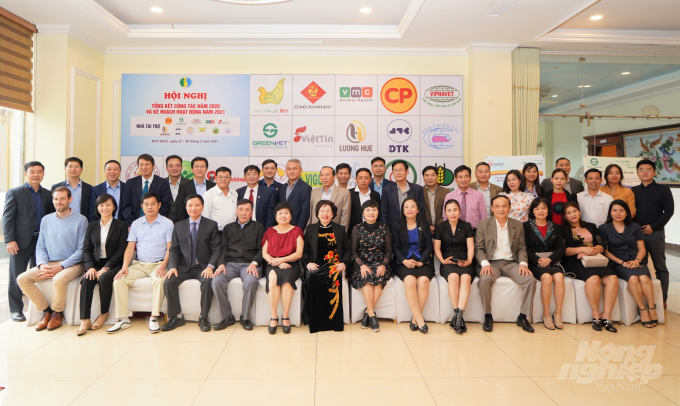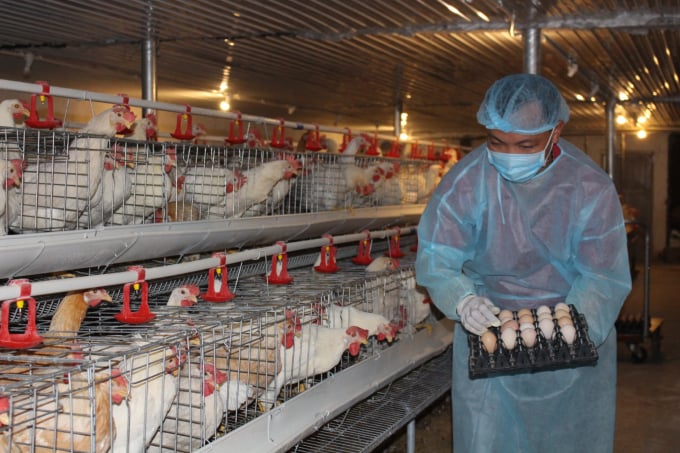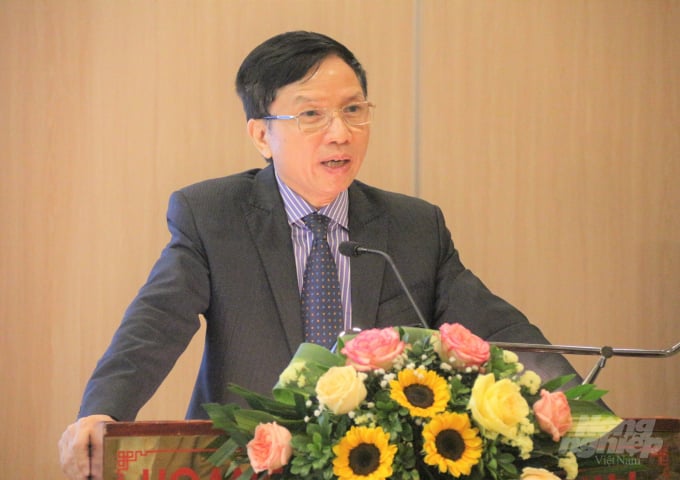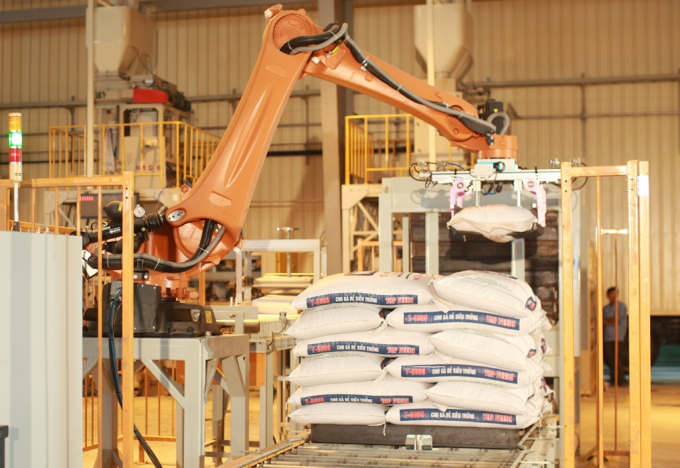May 19, 2025 | 22:12 GMT +7
May 19, 2025 | 22:12 GMT +7
Hotline: 0913.378.918
May 19, 2025 | 22:12 GMT +7
Hotline: 0913.378.918
The Vietnam Poultry Association (VIPA) held a conference on March 28 to review the work in 2020 and set an implementation plan for 2021.

Delegates attend the conference held by Vietnam Poultry Association on March 28 to review works of 2020 and set plan for 2021. Photo: Pham Hieu.
Speaking at the Conference, Mr. Nguyen Song Thao, Deputy Director of Personnel and Organization Department (Ministry of Agriculture and Rural Development) affirmed that poultry farming was a very vital technical and economic sector. In recent years, the poultry industry in Vietnam had grossed very important achievements.
According to Mr. Thao, in 2010, Vietnam had a total flock of 100 million poultry. By 2020, it had increased to 530 million. Poultry meat production also increased from 600,000 tons in 2010 to 1.4 million tons in 2020. Egg productivity surged from 6 billion to over 14 billion eggs. Moreover, poultry meat and egg products have not only met the domestic consumption demands of nearly 100 million people in the country but also started to export through official channels.
Besides, traditional breeding methods continue to be maintained at a higher quality in Vietnam, at the same time with the appearance and development of new modern and large-scale industrial methods in advanced and modern production technology. Therefore, the economic and technical indicators have also been significantly improved.
“The Association, with the participation of a majority of businesses and large farm owners operating in the field of poultry farming, takes about 65% market share of poultry meat and eggs. VIPA always plays an important role in the country’s poultry industry,” Mr. Thao emphasized.
According to Mr. Nguyen Thanh Son, Chairman of VIPA, the Covid-19 pandemic in 2020 had caused negative impacts on all aspects of life, the economy, and society worldwide. Vietnam was not an exception.
The difficulties of our country's economy in general as well as the fierce competition in the poultry sector in particular had significantly affected VIPA members’ activities.

The poultry industry has overcome difficulties and now is looking forwards to further targets of export. Photo: TL.
However, in the past year, VIPA still attained many achievements in production and business. Many products such as breeders, animal feed, veterinary medicine, equipment, and product processing of VIPA accounted for a large proportion of the whole livestock sector. Member enterprises’ reputation and role had continuously improved not only in domestic but also in the world market.
In 2020, although the consumption market of poultry products faced much hardship, it was recognized as the year that VIPA enterprises reached a record of strong growth in the breeding industry. It was estimated that the total number of chicken breeds that the association’s members produced in 2020 was about 350 million, of which there were more than 200 million with different colors on feathers, and more than 150 million with white feathers.
However, for the whole year 2020, the prices of poultry products, especially those of commercial breeds and eggs, always stood at a low level, thus the profits of businesses were not high, some businesses even suffered losses.
Especially, the year 2020 marked a milestone that many VIPA member businesses having invested and put into operation the most modern chicken breeding, hatching, and processing facilities in Southeast Asia.
In the field of poultry feed production, some VIPA members still achieved high volumes and sale value. It was estimated that poultry fodder production in 2020 was about 400-450 thousand tons.
In the field of veterinary medicine production, although the livestock market faced many difficulties in the past year, some member companies maintained stable production and trade providing good services for the market.
Veterinary medicine products and vaccines produced by the above companies have gradually dominated the domestic market and are trusted by VIPA's members.

VIPA Chairman, Mr. Nguyen Thanh Son speaks at the Conference. Photo: Pham Hieu.
In the field of poultry product processing, businesses are still making all efforts to maintain production for supply to the market with clean and good quality meat and poultry products.
At the same time as maintaining the services in the domestic market, the businesses in the Association are looking to expand to foreign markets such as Myanmar, Japan, Hong Kong and Russia.
VIPA Chairman Nguyen Thanh Son said in 2021, the Association will continue to promote intra-regional trade and build strong and effective link groups.
In addition, it will support a number of businesses to promote their export of breeds, processed meat and eggs, veterinary medicine, and animal feed. It will also continuously update price information and market forecasts for its members.
"In addition, the Association will develop a project and pilot a quality certification program for VIPA members’ products including breeds, animal feed, veterinary medicine, farm equipment and other processed products," Mr. Son said.
Also at the conference, enterprises complained that the process of announcing the conformity of animal feed still had many irrational points and obstacles. Typically, they said, in the announcement regulations of domestically produced animal feed, the assessment of production process and on-site sampling was quite complicated and impractical.
The regulations include those for monitoring of animal feed circulated in the market every 12 months, the 3-year deadline for conformity certification while 5-year validity for the certificate circulation are all not reasonable with reality.

Enterprises said that procedures for certification of animal feed conformity are still very shortcomings. Photo: Pham Hieu.
For imported animal feed, the current regulations on labels of imported animal feed demanded that imported conformity feed must be stamped the same on each product lot. Meanwhile, import labels are now stamped by the supplier on the product before importing into the country.
Imported animal feed consignments are regulated to exempt from quality inspection, but still have to be certified according to the conformity regulation, which means that the exemption from a quality inspection is not meaningful.
Many companies also complained that all imported animal feed products have now been registered and checked for quality during customs clearance, but they still have to get a certification of conformity. This is unnecessary as it is causing more difficulties for the businesses.
These obstacles have wasted time and human resources for companies as they have to pass through many repeated and complicated administrative procedures.
At the same time, the cost for testing, reprinting the package and label, and changing the batch is very expensive. Meanwhile, breeders will be under pressure from an increase in the price of animal feed, causing complications in the management process of agencies and authority departments./.
“Following the Government's policy on restructuring the livestock sector, the Ministry of Agriculture and Rural Development proposes the Association to continue to strive to be the leader of the poultry industry in Vietnam in technological reform and in the way to organize production in the direction towards a modern and high competitive development. In the period of deep international integration, the Association needs to continously strive to keep its core values," Mr. Nguyen Song Thao, Deputy Director of the StaffnOrganization Department (MARD) has proposed.
Translated by Kim Khuyen
![Reducing emissions from rice fields: [Part 1] Farming clean rice together](https://t.ex-cdn.com/nongnghiepmoitruong.vn/608w/files/news/2025/05/05/z6509661417740_a647202949c539012a959e841c03e1d3-nongnghiep-143611.jpg)
(VAN) Growing clean rice helps reduce environmental pollution while increasing income, allowing farmers to feel secure in production and remain committed to their fields for the long term.
/2025/05/19/5136-1-144800_230.jpg)
(VAN) The Nghe An Provincial People's Committee has just approved the list of beneficiaries eligible for revenue from the Emission Reductions Payment Agreement (ERPA) in the North Central region for the year 2025.

(VAN) 14 out of 35 domesticated elephants in Dak Lak province have had their living conditions improved, with 11 of them currently participating in the non-riding elephant tourism model.

(VAN) Muong Nhe Nature Reserve hopes that being upgraded to a national park will lay the foundation for forest protection efforts to be carried out in a systematic, modern, and sustainable manner.
/2025/05/16/3923-2-171845_52.jpg)
(VAN) Lower costs, higher yields, and improved soil quality are outstanding benefits that soybeans bring when integrated into the crop rotation system.

(VAN) The 'For a Green National Environment' programme aims to promote a green lifestyle, support businesses in implementing ESG practices, and turn Net Zero commitments into concrete actions.

(VAN) Cold-barn systems efficiently manage environmental and temperature conditions, which aids in the prevention of respiratory diseases in pigs and protects them from the vectors that transmit African swine fevers.